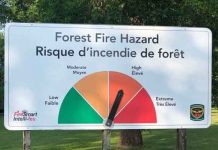Broken commitment on flood means availability of insurance now in question
OTTAWA, ON – On Monday, the federal government released its Fall Economic Statement. Following the government announcement, Celyeste Power, President and CEO, Insurance Bureau of Canada (IBC), issued the following statement:
“After the costliest summer in Canadian history, with almost $8 billion in insured losses due to floods, hail and wildfires, the Trudeau government has once again failed to invest in climate adaptation and resilience measures that are needed to keep Canadians safe. This week’s Fall Economic Statement (FES) also demonstrates a broken commitment made in Budget 2024 to implement a national flood insurance program for high-risk households by 2025. Needed funding to stand up a subsidiary of CMHC by April 1st was not included in the FES.
“While Finance Canada has been studying the flood insurance program for most of the past decade, the Canadian property and casualty (P&C) insurance industry has developed a range of overland flood insurance products that are now available to over 90% of Canadian homeowners. As the risks of flooding increase, the P&C insurance industry has paid out over $9 billion in flood-related claims since 2015. Nearly $4 billion of that was paid out this past summer alone.
“One and a half million Canadian households remain at high risk of flooding and cannot access flood insurance. Insurers have offered to partner with governments on a specialized flood insurance program that would replace costly taxpayer-funded government bailouts, such as Disaster Financial Assistance Arrangements. While Finance Canada continues to study and debate this flood program, policyholders and taxpayers will continue to bear the brunt of poor planning decisions, aging infrastructure and our changing climate. This gap in financial protection will only grow as more homes are built in regions at high risk of natural hazards. A new independent report from the CD Howe Institute found that Canada is one of the costliest countries to insure among OECD countries and revealed a direct correlation between the existence of public-private insurance partnerships, such as the proposed flood insurance program, and the affordability of insurance.
“Furthermore, the Trudeau government has neglected to commit new funding for climate adaptation measures that would build resilience in the communities that are continually being hit hardest by severe weather events, including wildfires. Instead, it has chosen to direct hundreds of millions in funding toward climate measures that will have no impact on protecting homes against floods and wildfires today. To exacerbate the problem, their new housing plan will also create new risks for communities and households for decades to come, by encouraging new building on flood plains and in other high-risk areas while giving no thought to building homes and infrastructure to withstand our current and changing climate. IBC and the P&C insurance industry are disappointed in the lack of urgency shown by the government on this serious issue that has impacted hundreds of thousands of Canadians this year.”
About Insurance Bureau of Canada
Established in 1964, Insurance Bureau of Canada (IBC) is the national industry association representing Canada’s private home, auto and business insurers. Its member companies make up the vast majority of Canada’s highly competitive property and casualty (P&C) insurance market.
As the leading advocate for Canada’s private P&C insurers, IBC collaborates with governments, regulators and stakeholders to support a competitive environment for the P&C insurance industry to continue to help protect Canadians from the risks of today and tomorrow.
IBC believes that Canadians value and deserve a responsive and resilient private P&C insurance industry that provides insurance solutions to both individuals and businesses.
SOURCE Insurance Bureau of Canada




